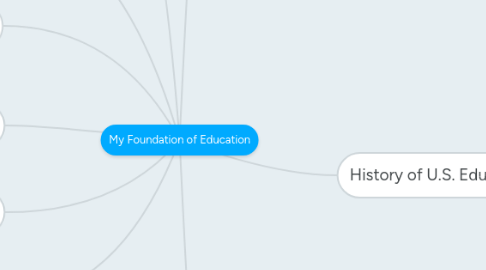
1. Philosophy of Education
2. Schools as organizations
3. Curriculum and Pedagogy
4. Equality of opportunity
5. Educational inequality
6. Educational reform
7. Politics of Education
7.1. Conservative perspective
7.1.1. looks at social evolution as a process that enables the strongest individuals and/or groups to survive, and looks at human and social evolution as adaptation to changes in environment.
7.1.2. believes that the free market or market economy of capitalism is both the most economically productive economic system and the system that is most respectful of human needs.
7.1.3. Role of the school: Provide the necessary educational training to ensure that the most talented and hardworking individuals receive the tools necessary to maximize economic and social productivity.
7.2. Liberal perspective
7.2.1. believes that the free market, if left unregulated, is prone to significant abuses, particularly to those groups who are disadvantaged economically and politically.
7.2.2. capitalist market economy is prone to cycles of recession that must be addressed through government intervention.
7.2.3. Role of school: Provide the necessary education to ensure that all students have equal opportunity to succeed in society.
7.2.3.1. See the role of education as balancing the needs of society and the individual in a manner that is consistent with a democratic and meritocratic society.
7.3. Neo Liberal perspective
7.3.1. Austerity
7.3.1.1. cutting public spending on education
7.3.2. The market model
7.3.2.1. free market solves social problems better than governmental policy
7.3.3. State Intervention
7.3.3.1. necessary to ensure equality of opportunity
7.3.4. Economic prosperity, race, and class
7.3.4.1. important factors in achievement gaps.
7.3.5. individualism
7.3.5.1. educational success or failure is a result of individual effort rather than social and economic factors
7.4. Radical perspective
7.4.1. does not believe that free market capitalism is the best form of economic organization.
7.4.2. democratic socialism is a fairer political economic system.
7.4.3. Role of school: Social and cultural reproduction
7.4.3.1. Perpetuate the society and to serve the interests of those with economic wealth and political power.
8. History of U.S. Education
8.1. Colonial Era
8.1.1. Old Deluder laws est. a precedent for public responsibility in education.
8.1.2. Utilitarianism
8.1.2.1. Benjamin Franklin
8.1.2.1.1. education for youth based on secular and utilitarian courses
8.1.2.1.2. mastery of process rather than rote learning
8.1.2.1.3. self improvement through education
8.1.2.2. Practical aspects of math such as accounting and natural history.
8.1.3. Civic motive
8.1.3.1. Thomas Jefferson
8.1.3.1.1. best safeguard for democracy is a literate population
8.1.3.2. Bill for the more general diffusion of knowledge
8.1.3.2.1. provide free education to all children for first three years
8.2. Common School
8.2.1. Horace Mann
8.2.1.1. Secretary of first state board of education
8.2.1.2. social mobility
8.2.2. Free publicly funded elementary school
8.2.3. Early 1800;s
8.3. Women
8.3.1. 1800's viewed as biologically harmful and too stressful
8.3.2. 1821 Emma Willard opens Troy Female Seminary
8.4. African Americans
8.4.1. 1846 Roberts v. City of Boston
8.4.1.1. local school committee had right to establish separate educational facilities for whites and blacks
8.4.2. 1868 Howard University est
8.5. Public High School
8.5.1. prior to 1875: 25,000 students enrolled
8.5.2. 1880-1920: 2,382,542 enrolled
8.5.3. 1940: 6,500,000 enrolled
8.5.4. Committee of Ten
8.5.4.1. Cardinal Principals
8.5.4.1.1. Health
8.5.4.1.2. Command of fundamental processes
8.5.4.1.3. Worthy home membership
8.5.4.1.4. Vocation
8.5.4.1.5. Citizenship
8.5.4.1.6. Worthy use of leisure
8.5.4.1.7. Ethical character
8.6. Cycles of Reform
8.6.1. Pedagogical Traditionalism
8.6.1.1. knowledge centered education
8.6.1.2. traditional subject centered curriculum
8.6.1.3. teacher centered education
8.6.1.4. discipline and authority
8.6.1.5. defense of academic standards in the name of excellence
8.6.2. Pedagogical Progressivism
8.6.2.1. curriculum responds to needs of students and time
8.6.2.2. child centered education
8.6.2.3. freedom
8.6.2.4. individualism
8.6.2.5. academic standards in name of equity
8.7. Interpretations
8.7.1. Democratic Liberal
8.7.1.1. progressive evolution of a school system committed to providing equality of opportunity for all.
8.7.2. Radical Revisionist
8.7.2.1. each period of reform led to increasing stratification within the educational system, with working class, poor, and minority students getting the short end of the stick.
8.7.3. Conservative
8.7.3.1. historical pursuit of social and political objectives resulted in significant harm to the traditional academic goals of schooling
9. Sociological Perspectives
9.1. Labeling Perspective
9.1.1. rejects any assumption that a clear consensus exists as to what constitutes a norm violation
9.1.2. result of a variety of contingencies influenced by who has the power to enforce such determinations
9.1.3. shift attention from the deviant to the judges of deviance and the forces that affect their judgement
9.1.3.1. Illich says legitimate judge of such mastery has become restricted to those who carry the role of teacher
9.1.4. sources of information
9.1.4.1. first hand obtained from face to face interaction with the labeled and second hand from other than direct interaction
9.1.4.2. comments from other teachers, test scores, prior report cards, permanent records, meetings with parents, evaluations
9.1.5. outcome
9.1.5.1. "If men define situations as real, they are real in their consequences."
9.1.5.2. schools serve as chief instrument in the creation of delinquency
9.1.5.3. expectations affect the way we behave and the way we behave affects how other people respond
9.2. Functional Theories
9.2.1. stress the interdependence of the social system
9.2.2. examine how well the parts are integrated
9.2.3. consensus is the normal state in society and conflict represents a breakdown of shared values
9.2.4. schools socialize students into the appropriate values and sort and select students based on their abilities
9.2.5. create structures, programs, and curricula that are technically advanced, rational, and encourage social unity
